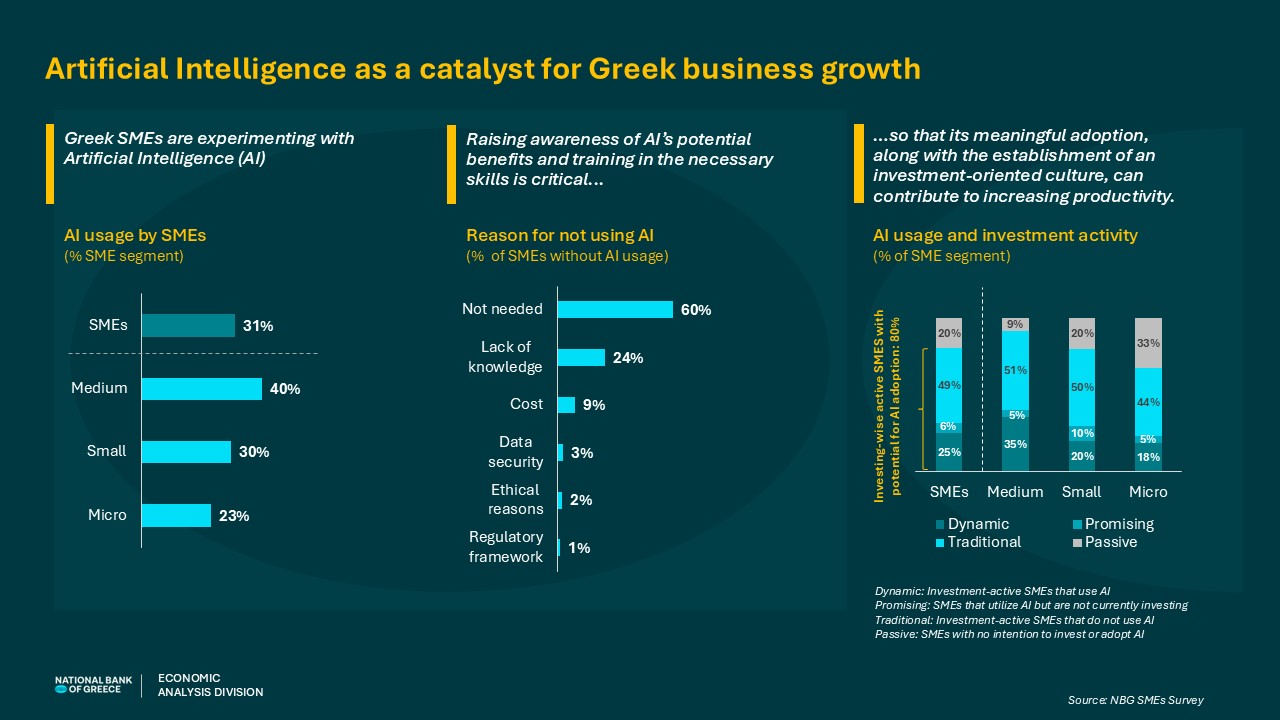Artificial Intelligence (AI), widely recognized internationally as the next major driver of productivity, is beginning to gain ground on the Greek business landscape. According to the latest survey by the National Bank of Greece on small and medium-sized enterprises (SMEs), already 1 in 3 SMEs has engaged with AI tools — a development that signals this technology is no longer the domain of “the few and the large”. At the same time, however, significant potential remains untapped, as about 1 in 2 enterprises, despite actively engaging in investments, has yet to attempt utilizing AI. The challenge for businesses is twofold: first, to be convinced that AI is relevant to them, and second, to acquire the skills necessary for its practical implementation. Activating this critical — yet technologically dormant — segment of entrepreneurship is a pivotal challenge for the Greek economy, as the broader diffusion of AI, combined with increased investment intensity, can serve as a dual catalyst in closing the productivity gap with the rest of Europe.
Official European data records the strategic use of AI by 6% of Greek SMEs — a figure that is approaching the European average (8%) but still far from the EU goal of 75% business adoption by 2030. To provide a deeper understanding of the landscape, the National Bank of Greece leveraged its regular field research on SMEs, exploring not only who already uses AI as a core tool but also who has begun experimenting with related applications. The result is particularly encouraging: 1 in 3 SMEs is already engaging in some form of interaction with AI tools, even if at a non-strategic or early stage. Usage mainly involves simple applications (such as text and image generation), but 1 in 3 users have dared to venture into more advanced areas, such as data analysis. This trend reveals an emerging wave of technological experimentation that, until now, has not been captured by official statistics.
Interest in AI carries significant weight, due to its anticipated benefits, that are far from negligible. According to international studies, AI could boost productivity by 17.5% over the next two decades — more than the internet, and nearly half the impact of landmark technologies such as electricity or the steam engine. At the current stage, however, the effects on business performance remain limited: AI users report a sales boost of just 1 percentage point (vs non-users), likely because usage is still experimental and not yet integrated into the core of the production process. Beyond this promising indication, our research reveals two key findings:
- First, the most dynamic segment of SMEs are those that have already turned to AI. These are primarily companies with an outward-looking and investment-oriented profile, pioneering and experimenting with new technological tools. If the expected productivity benefits of AI are confirmed, the performance gap between these businesses and the rest of the sector may widen significantly.
- Second, the main reason that a large portion of businesses refrain from using AI is not primarily cost or regulatory barriers, but rather deeper cognitive obstacles. The research shows that about half of the SME segment believes AI is not useful for their specific business. Additionally, 1 in 4 businesses reports being unable to utilize it due to lack of relevant skills. These findings indicate that the main challenge for broader AI adoption lies in awareness and training.
Having identified the need to fully leverage the potential of artificial intelligence, it is important to emphasize that AI is an enabling technology — one that integrates into the production process rather than replacing it. Therefore, the primary requirement for boosting productivity remains the strengthening of capital investment, particularly addressing Greece’s investment gap compared to the EU, which still stands at around 32%.
The most encouraging finding of the analysis is that 80% of Greek SMEs have already shown a willingness to evolve — either by investing, experimenting with AI technologies, or doing both. With proper awareness of AI's capabilities and training in the necessary skills, a significant portion of these enterprises could move from intention to action. If this trend takes hold, Greece could move closer to achieving the European goal of 75% AI adoption among enterprises by 2030. Reaching that target — combined with the gradual establishment of a more mature investment culture — could serve as a catalyst for boosting productivity and, ultimately, narrowing the productivity gap that separates Greece from the rest of Europe.
See the infographic:
